|
|
|
Sort Order |
|
|
|
Items / Page
|
|
|
|
|
|
|
| Srl | Item |
| 1 |
ID:
157931
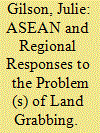

|
|
|
|
|
| Summary/Abstract |
Popularly represented as the phenomenon of “land grab,” changes in the acquisition, exploitation and significance of land across the world encapsulate myriad needs, motivations, and strategic ambitions. What is becoming clear is that these diverse burgeoning twenty-first-century phenomena in the name of land increasingly define and structure many of the decisions made by states and international institutions today. Despite being one of the most pressing regional and international problems of the current era, however, the issue of land grab is not on the agenda of the Association of Southeast Asian Nations. Member states of this association have acknowledged the transboundary effects of many contemporary phenomena and work together to alleviate security concerns and enhance collective economic opportunities, and yet they face both institutional and cognitive barriers to any attempts to address collectively the problems related to land grabbing. This article aims to examine the contemporary political space navigated and contested within ASEAN and to define the problems inherent in finding a collective action solution to this complex dynamic set of issues.
|
|
|
|
|
|
|
|
|
|
|
|
|
|
|
|
| 2 |
ID:
152617
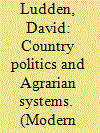

|
|
|
|
|
| Summary/Abstract |
The forceful expropriation of land, labour, water, and other productive resources is fundamental for processes of agricultural expansion and intensification. What is known today as ‘land grab’ was theorized by Marx as ‘primitive accumulation’ and by David Harvey as ‘accumulation by dispossession’. Today it is most prominent and controversial in Africa, where the governments of India and China are major perpetrators; and it also drives most contemporary urban expansion in India and China. This article deploys David Washbrook's idea of ‘country politics’ to explore the process of land grabbing in the early-modern expansion of agrarian Bengal, where local peasant society and worldwide imperial political economy came together to expand frontiers of farming in what is now the Sylhet District of Bangladesh.
|
|
|
|
|
|
|
|
|
|
|
|
|
|
|
|
| 3 |
ID:
125894


|
|
|
|
|
| Publication |
2013.
|
| Summary/Abstract |
With the 'global land grab' now a primary ongoing process in the developing world, greater attention to region-specific analyses provides critical insights for effective policy responses. The Indian Ocean world has the greatest regional concentration of large-scale land acquisitions (LSLAs) globally, and it is also where most of the investor countries reside. Yet examination of Indian Ocean-specific patterns and processes of LSLAs is lacking. One of the most sought after categories of lands are those in forested or recently forested areas, owing to their high potential natural resource and agricultural value. This review article examines the primary issues, actors and impacts of LSLAs of forest-related lands in the broader Indian Ocean world, while assessing the opportunities for national populations of target countries as well as investors and the key social and environmental concerns requiring policy attention.
|
|
|
|
|
|
|
|
|
|
|
|
|
|
|
|
| 4 |
ID:
130644


|
|
|
|
|
| Publication |
2013.
|
| Summary/Abstract |
With the 'global land grab' now a primary ongoing process in the developing world, greater attention to region-specific analyses provides critical insights for effective policy responses. The Indian Ocean world has the greatest regional concentration of large-scale land acquisitions (LSLAs) globally, and it is also where most of the investor countries reside. Yet examination of Indian Ocean-specific patterns and processes of LSLAs is lacking. One of the most sought after categories of lands are those in forested or recently forested areas, owing to their high potential natural resource and agricultural value. This review article examines the primary issues, actors and impacts of LSLAs of forest-related lands in the broader Indian Ocean world, while assessing the opportunities for national populations of target countries as well as investors and the key social and environmental concerns requiring policy attention.
|
|
|
|
|
|
|
|
|
|
|
|
|
|
|
|
| 5 |
ID:
125844
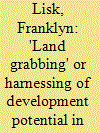

|
|
|
|
|
| Publication |
2013.
|
| Summary/Abstract |
Large-scale foreign investment in Africa's abundant but largely underutilized arable land has been criticised by international NGOs and social movements as 'land grabbing', which limits access of smallholder farmers to land, deprives local people of their livelihoods and threatens local and national food security across the continent. By way of contrast, many host governments and some leading international development agencies regard land-based investments as beneficial for development in terms of providing the necessary capital and technological know-how for modernising the region's neglected agriculture including take-off in agribusiness and agro-industrialisation, which is vital to much needed economic diversification in many African countries. East Asia's participation in the global land rush on Africa is examined from the standpoint of these two different perspectives: while China's growing presence and involvement in trade and investment in mining, energy and infrastructure in Africa is well known, less recognised is its involvement and those of other East Asian countries such as South Korea, Malaysia, Singapore and Vietnam in agriculture through large-scale land acquisitions. The development consequences and policy implications of these foreign land-based investments are analysed from a political economy perspective, which identifies motives, interests and benefits of the different actors and addresses the question of governance in terms of transparency and appropriate institutional arrangements to safeguard land rights and food security. In the bigger picture, the paper argues that the negative consequences of land grab has to be seen alongside the benefits flowing to Africa from growing economic relations with China and other dynamic East Asian economies and learning from the development experiences of those countries. African countries however need to re-assess the current approach and relationship with foreign land-based investors and decide how best this trend can be used to forward their economic and social agendas.
|
|
|
|
|
|
|
|
|
|
|
|
|
|
|
|
| 6 |
ID:
124925
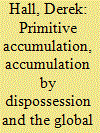

|
|
|
|
|
| Publication |
2013.
|
| Summary/Abstract |
Critical scholars have made extensive use of the concepts of primitive accumulation and accumulation by dispossession to analyse the global land grab. These concepts have been crucial to efforts to understand the land grab in terms of the creation, expansion and reproduction of capitalist social relations, of accumulation by extra-economic means, and of dispossessory responses to capitalist crises. This paper provides an overview of these approaches. It also argues that there are substantial challenges involved in the use of primitive accumulation and accumulation by dispossession, including tensions and ambiguities over what the concepts mean, the assumptions embedded within them and problems of fit with other conceptualisations of the land grab. The paper also highlights resources for engaging with these challenges in the land grab literature.
|
|
|
|
|
|
|
|
|
|
|
|
|
|
|
|
| 7 |
ID:
173687
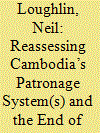

|
|
|
|
|
| Summary/Abstract |
The dominant literature on Cambodian politics over the past two decades suggested that a mixture of elite and mass clientelism had enabled the hegemonic Cambodian People’s Party (CPP) to rule via competitive but authoritarian elections, while lessening its previous reliance on repression and violence. Such explanations did not predict the upswing in contestation in the country in 2013 and thereafter. Neither do they account for the crackdown that followed. Following literature that draws attention to the tensions in building and maintaining political coalitions under authoritarianism, and demonstrating the difficulties in maintaining competitive authoritarianism over time, this article draws attention to structural, institutional, and distributional impediments to the CPP leadership in building and maintaining effective reciprocal relations with electoral clients while simultaneously balancing the interests of the military and other elites at the core of the regime. To make its argument, the article compares weaknesses in the CPP’s electoral clientelism with the effectiveness of patronage within the security forces, seen through the lens of Cambodia’s experience of land dispossession. It shows that an extractive and exclusive political economy privileged the interests of regime insiders over potential mass electoral clients precisely during the same period the CPP was supposed to be securing its hold on power via mass electoral clientelism. This further explains why the regime fell back on repression over reform in response to the upswing in contestation manifest from 2013, and why, despite the failings of its mass patronage project, repression has nevertheless been successful as a strategy for regime survival during a period of heightened popular contestation.
|
|
|
|
|
|
|
|
|
|
|
|
|
|
|
|
|
|
|
|
|